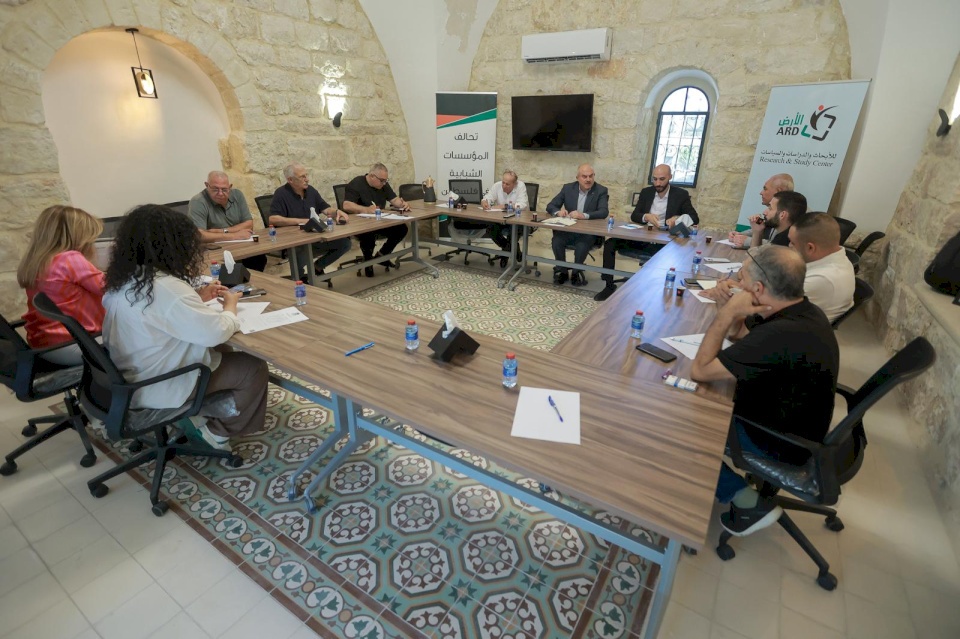
Youth Institutions Alliance Discusses Local Governance with Minister of Local Government
SadaNews: The Youth Institutions Alliance, in collaboration with the Land Research Center for Studies and Policies, held a dialogue session yesterday with the Minister of Local Government, Dr. Sami Hijjawi, at the Qamat Foundation headquarters in Al-Bireh.
The discussion focused on the current reality of local authorities, ways to enhance citizen resilience, and the role of local councils in this regard, especially in areas threatened by annexation, land confiscation, and restrictions on citizens, as well as rampant attacks by settlers in various locations in the West Bank. All of these factors pose serious challenges to the ability of citizens to remain in their land, along with the difficult challenges resulting from the occupation's policies and their direct impact on the revenues of local authorities and their capacity to provide essential services to citizens.
Minister Dr. Sami Hijjawi opened the session by addressing the state of local authorities and the impact of political and economic conditions on their revenues and capacity to meet the needs of the population and provide essential services. He pointed out that Israeli occupation complicates these situations through various practices, whether through settlement expansion, land confiscation, or imposing restrictions on resources. Furthermore, he explained that the ministry is currently focusing on issues of digital transformation, alternative energy, and enhancing the decentralization approach in local administration, which are considered essential axes for facing challenges and enhancing the developmental role of local authorities, within the framework of the national development plan.
During the session, Wissam Qattani, Director of Al-Rozana Foundation for Preserving Palestinian Identity (member of the alliance), emphasized the importance of using modern digital tools as a direct channel between the ministry and citizens, which enhances transparency and ensures people’s participation in shaping priorities, warning that neglecting the media aspect would create a gap between the ministry and the community. He also stressed the need to document the violations and challenges faced by local authorities.
For his part, Anas Al-Ashta, Coordinator of the Youth Institutions Alliance and representative of Qamat Foundation, pointed to the legality of parking meters on streets and their implications for citizens' rights, stressing the need to review these policies in line with social justice and people's rights in public space. He called for creating a common mechanism between the government and youth institutions that allows for benefiting from allocating state-owned lands to establish youth centers and offices for local institutions that support their community work and meet the needs of young people.
Jamal Zaqout, Chairman of the Board of Directors of the Land Research Center, emphasized the necessity of having a national plan that aligns with local needs and priorities, asserting that the challenges faced by Palestinian society today are primarily political in nature and impose existential challenges. This requires addressing the lack of trust between the government and citizens and involving people in shaping policies and development plans to tackle various challenges.
The discussion also addressed several vital issues such as pastoral settlement, land leaks, finding practical solutions to support livestock wealth, and enhancing the resilience of communities in the face of environmental and developmental risks.
The session concluded by stressing the importance of continuing this type of meeting between civil society institutions and relevant ministries, especially since the Youth Institutions Alliance today includes over 50 institutions from across the country and works to enhance youth participation in shaping public policies and building bridges of cooperation between institutions, the government, and the community.
The dialogue highlighted the need to formulate solutions capable of unifying the efforts of village councils and developing the role of joint service councils, generalizing successful experiences in the process of integrating some councils, and enabling better investment of limited resources to address the priorities and challenges faced by the residents of these villages, including providing tangible incentives to accomplish this matter.
It is worth mentioning that the dialogue, which was moderated by Dr. Abdul Rahman Al-Tamimi, a board member of the Land Research Center, included participation from the Director-General of Local Government in Ramallah and Al-Bireh, Sa'il Hanoon, and the Minister's Advisor, Bashir Barghouti. Several representatives from civil society members of the Youth Institutions Alliance in Palestine attended the session.

Jerusalem: Rescue of a Man and Woman Trapped by Floodwaters Inside a Vehicle in Abu Ghosh

Police Investigate the Circumstances of a Citizen's Death in Tulkarem

Hamas: The Occupation's Pride in Arresting Yahya Ayyash's Wife is a New Folly

Izzar Sany Values the Installation of Pastor Imad Haddad as the Fifth Bishop of the Luther...

The Public Prosecution and Birzeit University Launch Training Program for the Diploma in S...

Civil Organizations: The Pace of Aggression Continues, Exacerbating the Catastrophic Situa...

After More than Two Years of War on the Gaza Strip, the Return and Loyalty Chess Champions...

